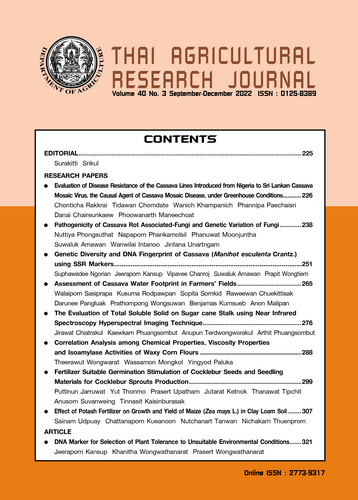DNA marker for selection of plant tolerance to inappropriate environments
DOI:
https://doi.org/10.14456/thaidoa-agres.2022.27Keywords:
DNA marker, Environmental stress tolerance, Heat, Salinity, DroughtAbstract
Unsuitable environmental conditions such as heat, soil salinity, drought, flooding and metal, are abiotic stresses that negatively affect plant growth and development leading to reduction of yield and quality of products. Among abiotic stresses, heat, salinity and drought are common problems and are strongly associated with global climate change. DNA marker technology is nowadays used in the selection process to enhance the efficiency and accuracy of plant breeding in improvement of many agricultural traits including tolerance to environmental stress. In this review, the information about the effect of abiotic stress on plant and researches on DNA markers related to heat, salinity and drought tolerance is presented, including examples of studies to identify quantitative trait loci (QTL) associated with tolerance to these stresses and the utilisation of relevant DNA markers for selection of tolerant cultivars in rice, cassava and legume. Besides, trends of technology used for plant selection and breeding in future are discussed.
References
จีราพร แก่นทรัพย์ ขนิษฐา วงศ์วัฒนารัตน์ ประสาน สืบสุข และรัชนี โสภา. 2561. การศึกษาความทนทาน
ต่อสภาพน้ำท่วมและสภาพแห้งแล้งของถั่วเหลืองพันธุ์รับรองของกรมวิชาการเกษตรโดยใช้เทคนิคทางชีวโมเลกุล. เอกสารประกอบการสัมมนาวิชาการ เรื่อง งานวิจัยถั่วเหลืองสู่ความมั่นคงด้านอาหารของไทย ประจำปี 2560 ณ ศูนย์วิจัยพืชไร่เชียงใหม่ ระหว่างวันที่ 13 -14 มีนาคม 2561. หน้า 48-51.
จีราพร แก่นทรัพย์ อัจฉราพรรณใจเจริญ รัชนี โสภา และสุมนา งามผ่องใส. 2565. การพัฒนาเครื่องหมาย
โมเลกุลในยีนทนแล้งและทนน้ำท่วม Dehydrin ของถั่วเหลืองพันธุ์รับรองของกรมวิชาการเกษตร. รายงานผลสัมฤทธิ์สำหรับโครงการปกติปีงบประมาณ พ.ศ.2564. สำนักงานคณะกรรมการส่งเสริมวิทยาศาสตร์ วิจัยและนวัตกรรม. 31 หน้า.
Carpentieri-Pipolo, A.E., H.R. Boerma and T.R. Sinclair. 2011. Identification of QTLs associated
with limited leaf hydraulic conductance in soybean. Euphytica. 186: 679–686.
Christou, P. 2013. Plant genetic engineering and agricultural biotechnology 1983-2013. Trends
Biotechnol. 31: 125–127.
De Leon, T.B., S. Linscombe, G. Gregorio and P.K. Subudhi. 2015. Genetic variation in
Southern USA rice genotypes for seedling salinity tolerance. Front. Plant Sci. 6: 374.
Do, T.D., T.D. Vuong, D. Dunn, et al. 2019. Identification of new loci for salt tolerance in
soybean by high-resolution genome-wide association mapping. BMC Genomics.
: 318.
Dong, O.X. and P.C. Ronald. 2019. Genetic engineering for disease resistance in plants: Recent
progress and future perspectives. Plant Physiol. 180(1): 26-38.
Guan, R.X., Y. Qu, Y. Guo, L.L. Yu, Y. Liu, J.H. Jiang, J.G. Chen, Y.L. Ren, G.Y. Liu, L. Tian, et al.
Salinity tolerance in soybean is modulated by natural variation in GmSALT3.
Plant J. 80(6): 937–950.
Hinojosa, L., M.N.M.E. Sanad, D.E. Jarvis, P. Steel, K. Murphy and A. Smertenko. 2019. Impact
of heat and drought stress on peroxisome proliferation in quinoa. Plant J. 99: 1144–
Kasuga, M., Q. Liu, S. Miura, K. Yamaguchi-Shinozaki and K. Shinozaki. 1999. Improving plant
drought, salt, and freezing tolerance by gene transfer of a single stress-inducible
transcription factor. Nat. Biotechnol. 17: 287–291.
Li, X.M., D.Y. Chao, Y. Wu, et al. 2015. Natural alleles of a proteasome α2 subunit gene
contribute to thermotolerance and adaptation of African rice. Nat. Genet. 47: 827–833.
Li, Y., Z. Yu, J. Jin, Q. Zhang, G. Wang, C. Liu, J. Wu, C. Wang and X. Liu. 2018. Impact of
elevated CO2 on seed quality of soybean at the fresh edible and mature stages.
Front. Plant Sci. 9, 1413.
Manavalan, L.P., S.K. Guttikonda, L.P. Tran and H.T. Nguyen. 2009. Physiological and
molecular approaches to improve drought resistance in soybean, Plant Cell Physiol. 50(7): 1260 – 1276.
Meuwissen, T.H.E., B.J. Hayes and M.E. Goddard.2001. Prediction of total genetic value using
genome-wide dense marker maps. Genetics. 157: 1819–1829.
Nadeem, M., J. Li, M. Yahya, A. Sher, C. Ma, X. Wang and L. Qiu. 2019. Research progress and
perspective on drought stress in legumes: a review. Int J Mol Sci. 20(10): 2541.
Rasaei, B., M.E. Ghobadi, M. Khas-Amiri and M. Ghobadi. 2013. Effect of osmotic potential on
germination and seedling characteristic of soybean seeds. Intl J Agri Crop Sci. 5: 1265-
Ren, Z.H., J.P. Gao, L.G. Li, X.L. Cai, W. Huang, D.Y. Chao, et al. 2005. A rice quantitative trait
locus for salt tolerance encodes a sodium transporter. Nat. Genet. 37: 1141–1146.
Tuyen, D., S. Lal and D. Xu. 2010. Identification of a major QTL allele from wild soybean
(Glycine soja Sieb. & Zucc.) for increasing alkaline salt tolerance in soybean.
Theor. Appl. Genet. 121: 229–236.
Ullah, I. 2009. Molecular Genetic Studies for Drought Tolerance in Cotton. Ph.D. Thesis,
Quaid-i-Azam University, Islamabad, Pakistan.
Waghmare, S. G., P. Sindhumole, M.R. Shylaja, D. Mathew, R.M. Francies, P.S. Abida and S.
Sajini. 2018. Analysis of simple sequence repeat (SSR) polymorphism between N22 and Uma rice varieties for marker assisted selection. Electron. J. Plant Breed. 9(2): 511-517.
Wang, B., X. Guo, P. Zhao, M. Ruan, X. Yu, L. Zou, Y. Yang, X. Li, D. Deng, J. Xiao, et al. 2017.
Molecular diversity analysis, drought related marker-traits association mapping and
discovery of excellent alleles for 100-day old plants by EST-SSRs in cassava
germplasms (Manihot esculenta Cranz.) PLoS ONE. 12: e0177456.
Warpeha, K.M., S.S. Lateef, Y. Lapik, M. Anderson, B.S. Lee and L.S. Kaufman. 2006. G-protein-
coupled receptor 1, G-protein Ga-subunit 1, and prephenate dehydratase 1 are required for blue light-induced production of phenylalanine in etiolated Arabidopsis. Plant Physiol. 140: 844–855.
Yang, H., X. Gu, M. Ding, W. Lu and D. Lu. 2018. Heat stress during grain filling affects activities
of enzymes involved in grain protein and starch synthesis in waxy maize. Sci. Rep. 8:
Younis, A., F. Ramzan, Y. Ramzan, F. Zulfiqar, M. Ahsan and K.B. Lim. 2020. Molecular markers
improve abiotic stress tolerance in crops: a review. Plants (Basel). 9(10): 1374.
Downloads
Published
How to Cite
Issue
Section
License
Copyright (c) 2022 Thai Agricultural Research Journal

This work is licensed under a Creative Commons Attribution-NonCommercial-NoDerivatives 4.0 International License.
Thai Agricultural Research Journal



